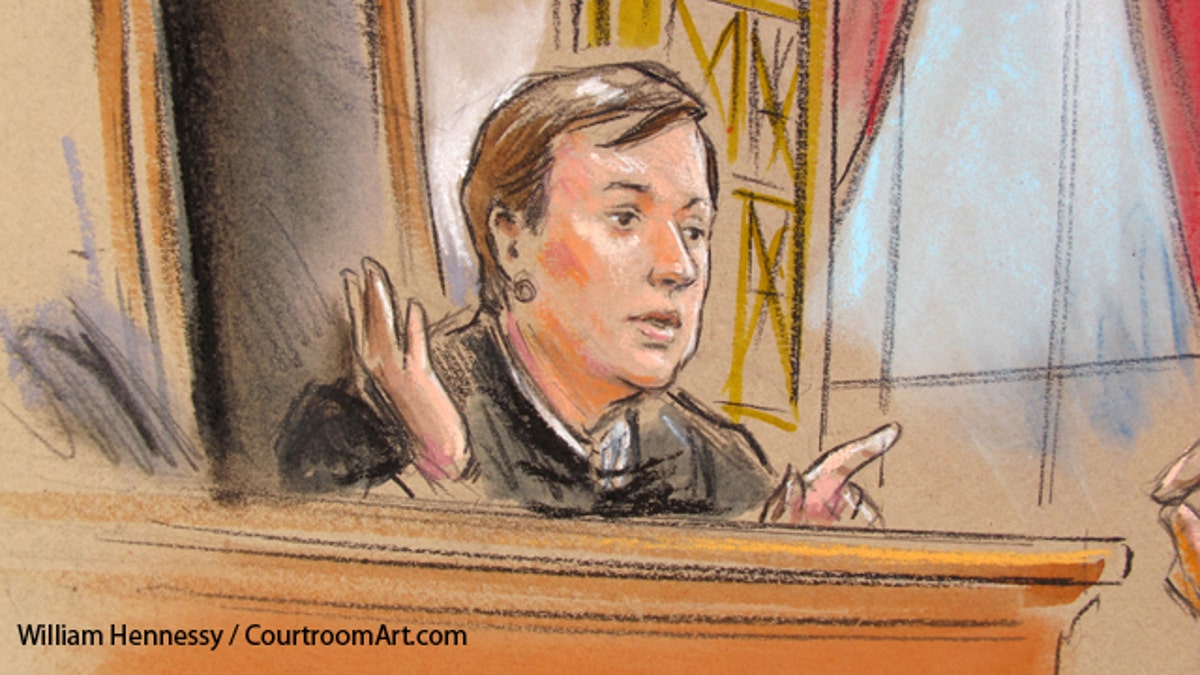
Shown here is a sketch of Supreme Court Justice Elena Kagan speaking March 28. (Courtesy of William Hennessy/CourtroomArt.com)
For the first time since its controversial 2010 ruling that businesses and labor unions can freely spend money in political campaigns, the Supreme Court returned to the thorny issue of regulating political speech when it spent a heated hour discussing the merits of a state campaign finance law that gives additional public money to candidates who are outspent by well-heeled opponents.
Justice Elena Kagan was the most aggressive defender of an Arizona law that provides matching dollars to publicly financed candidates who face privately backed opponents and third-party supporters that spend in excess of government limits.
"I'm not sure what it means to constitute a substantial burden if, in fact, the law does not chill speech," Kagan told lawyer William Maurer, who argued the law dissuades some people from spending money in favor of candidates who forego the public system out of concern that the publicly financed candidates will get more money.
While she has not shied away from asking questions during oral arguments, Kagan, in her first term on the high court bench, hadn't yet taken such a prominent role in a high-profile case. Her assertive questioning is also noteworthy because in 2009, she made her first-ever argument as solicitor general in a losing defense of the McCain-Feingold federal campaign finance law.
The 5-4 decision in the Citizens United case prompted a public rebuke from President Obama in his 2010 State of the Union address and almost certainly figured into his decision-making to nominate Kagan when Justice John Paul Stevens announced his retirement. Given that history, it was little surprise that Kagan was the court's most outspoken defender of the Arizona system.
While Citizen United and Monday's case both explored the scope of free-speech protections in political campaigns, the cases are very different. Instead, it was another recent high court decision striking down a federal law dubbed the "millionaire's amendment" that offered a closer parallel.
That law was designed to help candidates raise money when facing a challenge against a self-financed opponent. The 2008 decision in Davis v. FEC, also 5-4, rejected the creation of a different fundraising standard for different candidates.
Arizona's system, which is similar to other states, is designed to encourage political candidates to accept public financing thereby limiting the effect of outside donors and the overall amount of money spent in a particular race. If all candidates in a race agree to accept the public funds then there is no controversy. But candidates who elect to bypass the public dollars and therefore spend as much money as they wish claim the law's matching dollar provisions limit their First Amendment free-speech rights.
"This case is about whether the government may insert itself into elections and manipulate campaign spending to favor its preferred candidates," Maurer told the court. He represents a pair of state political action committees and two men who've run for state offices and filed a lawsuit against the Citizens Clean Elections Act.
The 1998 measure was passed in the wake of several corruption scandals in Arizona. It allows publicly financed candidates to get additional money, even beyond mandated limits, if their privately backed opponents or third-party interest groups collectively spend in excess of those limits.
"You can have a public financing system with sufficient funds to run an effective race," Maurer conceded. "But what you cannot do is exactly what Arizona has done, which is: 'Turn my act of speaking into the vehicle by which my political opponents benefit."
The fundamental intent of the law also came into dispute Monday. "I think the purpose of this law is to prevent corruption. That's what the purpose of all public financing systems are," Kagan said.
But that assertion was challenged by other justices who suspected lawmakers had another interest in mind. "I checked the Citizens' Clean Elections Commission web site this morning," Chief Justice John Roberts said referring to the Arizona agency responsible for enforcing the law.
"And it says that this act was passed to, quote, 'level the playing field' when it comes to running for office. Why isn't that clear evidence that it's unconstitutional?"
Multiple times throughout the argument, Justice Anthony Kennedy indicated his unease with the law, at one point asking if it would be a "fair characterization of this law to say that its purpose and its effect are to produce less speech in political campaigns?"
Following Monday's arguments, there was little to suggest that the court will reverse course from its recent campaign finance decisions and uphold the Arizona law. This observation was apparently shared by an exasperated Justice Stephen Breyer who near the end of the hour said he saw little utility in examining yet another specific provision of campaign finance law.
"It is better to say it's all illegal than to subject these things to death by a thousand cuts," Breyer said. "Because we don't know what will happen when we start tinkering with one provision rather than another."
A decision in the Arizona case is expected by the end of June.




